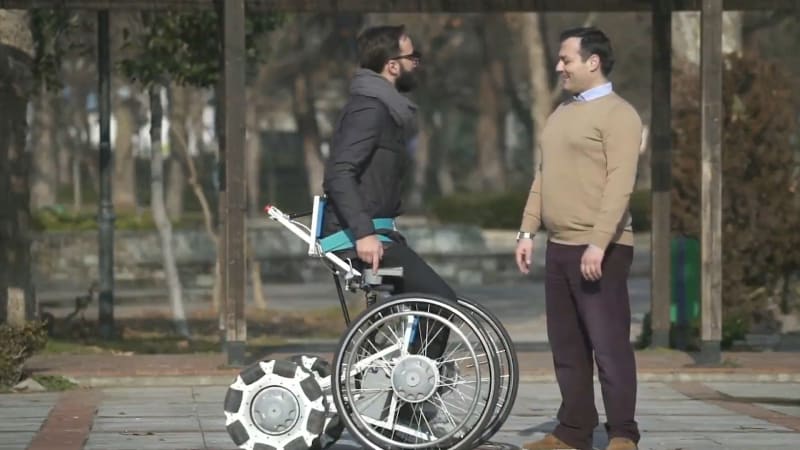Fresh useful insights for people advancing quality, innovative and sustainable journalism
OFF THE TOP
You might have heard: A survey from January found 91% of Americans believe partisan conflict is strong or very strong (Pew Research Center)
But did you know: Tough conversations may help Americans find common ground (Center for Media Engagement)
In a survey of about 1,100 Americans, the Center for Media Engagement found that people who are willing to discuss political differences are less likely to have negative opinions of the opposite party. However, this finding appears to have some limitations. According to the survey, those who discuss politics often with neighbors they disagree with may be more likely to be prejudiced against the opposition party even if they are less likely to have negative views of individual members of the party.
+ Noted: Black sports journalists have long been discouraged from talking about racial injustice, but now it’s part of the beat (Variety); Facebook is experimenting with linking accounts to subscriptions to avoid paywalls and logins (TechCrunch)
API UPDATE
Deadline extended: Apply to assess and improve your 2020 elections coverage with API’s Metrics for News
We’ve reopened applications for free access to our analytics program that helps publishers track and improve their 2020 elections coverage based on audience needs and engagement. The analytics tool, along with coaching from API staff and connections to a cohort of newsrooms focused on improving their elections coverage, will be available at no cost for up to 60 newsrooms from now through the November elections. Learn more and apply by September 15.
TRY THIS AT HOME
How journalists are coping with a heightened surveillance threat (Global Investigative Journalism Network)
In interviews with the Global Investigative Journalism Network, a dozen journalists from around the world expressed concerns about online harassment and surveillance during the pandemic, especially as they increasingly rely on digital communication. Pérez de Acha, a California investigative journalist, uses disposable sim-card numbers in some situations and encourages her sources to use the encrypted message app Signal, although she says most beats have a low risk for surveillance. Other digital security strategies include updating Windows, using a password manager and setting up a virtual private network, or VPN.
+ Earlier: This guide can help you identify and remove personal information from the internet to prevent being doxxed (NYT Open)
OFFSHORE
Manual helps Brazilian journalists with data and tips for election coverage (LatAm Journalism Review)
Earlier this month, the Institute for the Development of Journalism and the Institute of Education and Research created an online manual that aims to improve election coverage in Brazil. Aside from tips and tools, the manual walks reporters through the basics of elections, including who’s eligible to run for office and relevant legislation updates. The guide also delves into public policy and encourages journalists to focus on substantive issues like education instead of candidates’ personalities.
+ In China, WeChat censored keywords related to the coronavirus (Wired); Dozens of the BBC’s current and former employees allege a racist, toxic work environment (HuffPost); About 20 Belarusian journalists who work for international media outlets lost their accreditation (The Washington Post)
OFFBEAT
One thing that the pandemic could be changing? Meeting lengths (Fast Company)
The National Bureau of Economic Research analyzed email and calendar data from more than 3 million workers and found that since the pandemic, the average work day has grown by about 48 minutes. This mirrors conditions during the Great Recession, when about one-third of workers reported the economy had worsened their work-life balance as they took on more hours. The bureau also found that workers are attending more meetings, but they’re about 20% shorter than they were before COVID-19.
+ Microsoft and Walmart submitted a bid for Chinese-owned video app TikTok (The New York Times)
UP FOR DEBATE
Heading into election 2020, let’s ask ourselves: ‘What makes this newsworthy?’ (Markkula Center for Applied Ethics)
Anita Varma warns that horse race political coverage that relies on potentially unrepresentative polls and pundits turns voters into “passive spectators” during an election. She recommends that before journalists write about a certain election topic, they should evaluate if it’s newsworthy and if it would help the public become more engaged and informed voters. “If the answer is no, let’s start leaving such content and hashtags behind without regret,” Varma writes. “Clickbait masquerading as journalism, even (and especially) from ‘reputable, flagship’ news outlets, cannot foster a democratic process.”
+ “There is no horse race to cover for the 2020 US election,” wrote Jay Van Bavel on Twitter. “Opinions about Trump are so deeply entrenched that the polls don’t move + Biden is extremely well known. Therefore, stop covering the horse race & start covering actual policies + voter suppression.” (Twitter, @jayvanbavel)
+ Earlier: How to address voting disparities and difficulties experienced by your audiences (American Press Institute) — One suggestion is to create a personalized step-by-step guide to voting for readers, like Chicago’s WBEZ did (WBEZ)
SHAREABLE
At The New York Times, a final episode for the TV listings (The New York Times)
In a move that will be familiar to many local newspaper journalists, the Times is cutting daily television listings from its New York City edition after printing the guide for 81 years. The decision reflects viewers’ widespread adoption of streaming, which has made watching broadcast programs at a set time a thing of the past. Viewers also have seemingly endless options when it comes to choosing what to watch, a situation that has led the Times’ culture desk to shift away from the practice of reviewing every network and cable show. Instead, entertainment journalists at the paper have pursued more episode recaps, essays and critic’s notebook pieces.
The post Need to Know: August 31, 2020 appeared first on American Press Institute.
from American Press Institute https://ift.tt/31GVbmc










 Giovinazzi was ahead of Russell when his car snapped out of control at the exit of the Spa-Francorchamps track's fast Fagnes chicane. It hit the barriers, shedding the wheel that Russell hit, before rebounding across the track.
Giovinazzi was ahead of Russell when his car snapped out of control at the exit of the Spa-Francorchamps track's fast Fagnes chicane. It hit the barriers, shedding the wheel that Russell hit, before rebounding across the track.



 Former Mitsubishi Motors Chief Executive Osamu Masuko, who engineered the Japanese automaker’s alliance with Nissan, has died. Masuko was named a special adviser to the company when he resigned for health reasons as of Aug. 7. Mitsubishi Motors Corp. said he died of heart failure on Aug. 27.
Former Mitsubishi Motors Chief Executive Osamu Masuko, who engineered the Japanese automaker’s alliance with Nissan, has died. Masuko was named a special adviser to the company when he resigned for health reasons as of Aug. 7. Mitsubishi Motors Corp. said he died of heart failure on Aug. 27.

 SPA-FRANCORCHAMPS, Belgium (AP) — Lewis Hamilton led from start to finish at the Belgian Grand Prix to clinch his 89th career win and move two behind Michael Schumacher's Formula One record on Sunday. The world champion was untroubled from pole position, beating his Mercedes teammate Valtteri Bottas by eight seconds and finishing 15 seconds ahead of Red Bull's Max Verstappen. It's great for Hamilton, but he understands F1 fans might be getting a little bored.
SPA-FRANCORCHAMPS, Belgium (AP) — Lewis Hamilton led from start to finish at the Belgian Grand Prix to clinch his 89th career win and move two behind Michael Schumacher's Formula One record on Sunday. The world champion was untroubled from pole position, beating his Mercedes teammate Valtteri Bottas by eight seconds and finishing 15 seconds ahead of Red Bull's Max Verstappen. It's great for Hamilton, but he understands F1 fans might be getting a little bored.
 Once Android 11 rolls out, the list of phones that can use wireless Android Auto will grow considerably. Google has updated Android Auto’s FAQ page (as spotted by 9to5Google) to add that almost all devices installed with the upcoming mobile OS will get the capability to connect to compatible in-car entertainment systems without a wire. The updated page also notes that your phone must support 5GHz WiFi for wireless connection to work.
Once Android 11 rolls out, the list of phones that can use wireless Android Auto will grow considerably. Google has updated Android Auto’s FAQ page (as spotted by 9to5Google) to add that almost all devices installed with the upcoming mobile OS will get the capability to connect to compatible in-car entertainment systems without a wire. The updated page also notes that your phone must support 5GHz WiFi for wireless connection to work.




 SPA-FRANCORCHAMPS, Belgium (AP) — After clinching the record-extending 93rd pole position of his distinguished career, Formula One world champion Lewis Hamilton stood proudly on top of his all-black Mercedes and crossed his arms in memory of a hero of his own. The British driver dedicated his latest exceptional drive at the Belgian Grand Prix to American actor Chadwick Boseman, who died of cancer on Friday at the age of 43. “A superhero died last night so that was really weighing heavy on me t
SPA-FRANCORCHAMPS, Belgium (AP) — After clinching the record-extending 93rd pole position of his distinguished career, Formula One world champion Lewis Hamilton stood proudly on top of his all-black Mercedes and crossed his arms in memory of a hero of his own. The British driver dedicated his latest exceptional drive at the Belgian Grand Prix to American actor Chadwick Boseman, who died of cancer on Friday at the age of 43. “A superhero died last night so that was really weighing heavy on me t





 Hubert was racing in the Formula Two series, a feeder and support category to Formula One, when he suffered fatal injuries in a high-speed crash on the Saturday of the 2019 Belgian Grand Prix. "For me it is just very hard to accept he's not with us anymore," compatriot Pierre Gasly, who drives for Formula One team Alpha Tauri and grew up racing Hubert, told reporters via video conference on Thursday.
Hubert was racing in the Formula Two series, a feeder and support category to Formula One, when he suffered fatal injuries in a high-speed crash on the Saturday of the 2019 Belgian Grand Prix. "For me it is just very hard to accept he's not with us anymore," compatriot Pierre Gasly, who drives for Formula One team Alpha Tauri and grew up racing Hubert, told reporters via video conference on Thursday.
 Elon Musk isn't content with electric cars, shooting people into orbit, populating Mars and building underground tunnels to solve traffic problems. In a video demonstration Friday explicitly aimed at recruiting new employees, Musk showed off a prototype of the device. Ultra-thin wires hanging form the device would go directly into the brain.
Elon Musk isn't content with electric cars, shooting people into orbit, populating Mars and building underground tunnels to solve traffic problems. In a video demonstration Friday explicitly aimed at recruiting new employees, Musk showed off a prototype of the device. Ultra-thin wires hanging form the device would go directly into the brain.




 Plus a mysterious BMW M8 mule and the return of Delage with the D12 two-seater
Plus a mysterious BMW M8 mule and the return of Delage with the D12 two-seater






